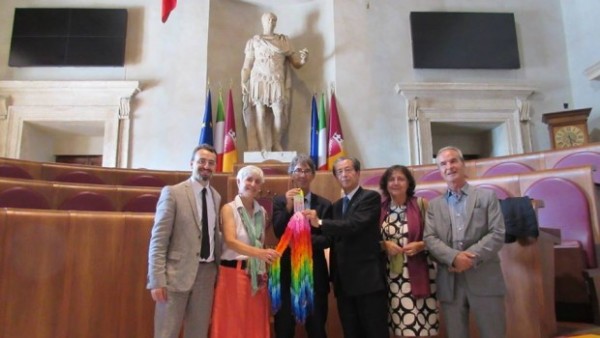A motion was recently submitted to the Italian Parliament supporting the humanitarian initiative and urging the government to take action towards a nuclear weapons ban. We spoke to Lisa Clark of PNND and Francesco Vignarca from Rete Disarmo about this motion, and what this could mean for Italy and its involvement in creating a ban on nuclear weapons.
Rete Disarmo and PNND Italy supported a motion that was presented by Parliamentarians for Peace and PNND members to the Italian Parliament about nuclear disarmament. What did the motion contain and do you think it is an important step?
The motion sums up all the recent developments towards nuclear disarmament. It welcomes the Humanitarian Initiative as a process that can strengthen efforts towards disarmament, as required by Article VI of the NPT. It reconstructs the process from Oslo to Nayarit and announces the Vienna Conference. It recalls and welcomes the OSCE Parliamentary Assembly’s Istanbul declaration and the resolution adopted by consensus by the International Parliamentary Union, as well as previous resolutions adopted unanimously in 2009, 2010, 2012 by the Italian Chamber of Deputies. Its operative paragraphs then call upon the Italian government to: participate actively in the Vienna Conference; to support an early commencement of negotiations towards a new legal instrument or package of agreements prohibiting nuclear weapons; to support in every way the Humanitarian Initiative; to propose that NATO’s Nuclear Planning Group undertake a public study on the humanitarian consequences of the use of nuclear weapons in the European countries involved in nuclear sharing; to support the proposal that calls upon NATO to adopt a no-first-use or non-use policy.
The discussions around the humanitarian impact of nuclear weapons seem to have rekindled an interest on the topic internationally. Italy has been quite reluctant with regards to its commitment to the humanitarian initiative. Do you think the Renzi government will be more outspoken?
The Renzi government has two key members (Defence and Foreign Ministers) who were PNND members before joining government. Federica Mogherini, the Foreign Minister, was the initiator of the three previous nuclear disarmament resolutions, calling on the national government to move towards the removal of US nuclear weapons in Europe and other confidence-building actions to encourage greater international cooperation towards zero. It is possible that the Foreign Minister may succeed in making Italy more proactive on nuclear disarmament.
What role can civil society play in the push for a treaty banning nuclear weapons?
Civil society needs to educate the Italian public on the possibilities currently opening up for progress on the treaty. We believe that the way a more informed public opinion can exert pressure on government is by recalling the important international role played by Italy in the process of banning landmines or the moratorium on the death penalty. Playing a leadership role in “ethical” choices is enshrined in the Italian Constitution (which states that Italy rejects war and voluntarily “agrees to limitations on its sovereignty that may be necessary to a world order ensuring peace and justice among Nations”). We believe this government will be sensitive to these arguments.
How is the nuclear weapons issue currently seen in Italy, and what level of public engagement currently exists? What are the opportunities there?
There is little awareness currently in Italy on the nuclear weapons issue, despite the presence of dozens of weapons in one or two bases. The campaign against the JSF F35 has much more widespread support, with a fairly well informed public opinion (thanks to a several-year-long campaign, also led by our Disarmament Network); we are linking the two issues through the opposition to nuclear-capable F35s.
What will be your focus in the coming months?
We hope to build awareness of the Humanitarian Initiative process and involve an increasing number of civil society groups in the ICAN campaign. We are hoping that a round table in Parliament in September during the International Day for the Elimination of Nuclear Weapons, the traditional Peace March from Perugia to Assisi on 19 October, and other actions throughout the summer and fall will allow us to build up a strong alliance of individuals and groups participating (and supporting from home) the ICAN Civil Society Forum in Vienna in December.










